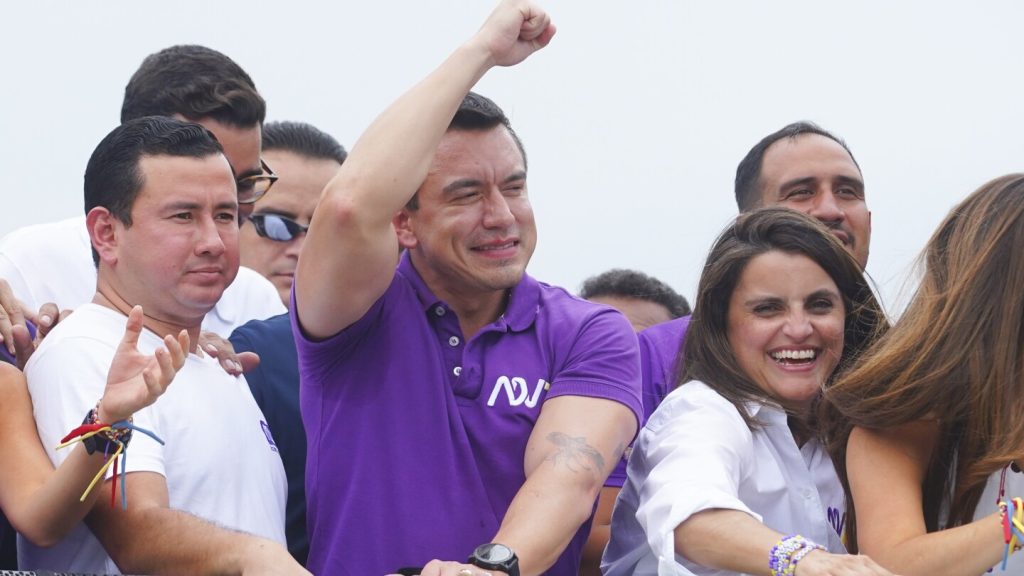The Rise of Daniel Noboa: A Political Phenomenon in Ecuador
Daniel Noboa, a young conservative millionaire with a brief political career, has stunned Ecuador with his rapid ascent to the presidency. Despite lacking established political machinery, Noboa emerged as a formidable candidate in the 2023 snap election, advancing to a runoff against the protegee of Ecuador’s influential former President Rafael Correa. His meteoric rise culminated in a 16-month presidency, during which he implemented aggressive crime-fighting strategies that polarized the nation. Now, Noboa is seeking a full four-year term in the 2025 election, aiming to continue his hardline approach to combating crime, which has resonated with a significant portion of the electorate.
Noboa’s political journey began in 2021 when he won a seat in the National Assembly, where he chaired the Economic Development Commission. At just 18, he had started an event organizing company, later joining his father’s Noboa Corp., a conglomerate built on the banana trade. His political rise was swift and unexpected, as he defeated leftist lawyer Luisa González in the October 2023 runoff, triggered by then-President Guillermo Lasso’s decision to dissolve the National Assembly. Noboa’s victory marked a turning point in Ecuadorian politics, as he campaigned on a promise to tackle the country’s spiraling violence, which had surged in recent years.
A Focus on Security: Noboa’s Crime-Fighting Strategies
Noboa’s presidency has been defined by his relentless focus on security. Under his leadership, Ecuador declared a state of internal armed conflict in January 2024, allowing the military to intervene in hotspots, including prisons overrun by organized crime. His government also made headlines worldwide for the controversial police raid on Mexico’s embassy in Quito to arrest fugitive former Vice President Jorge Glas. These tactics, while criticized by some, have garnered support from citizens who feel previous administrations failed to address the country’s security crisis. Security guard Diego Morales, a Noboa supporter, summed up the sentiment: “You can see that he is trying to take out criminals.”
The results of Noboa’s strategies are mixed. Homicide rates dropped from 8,237 in 2023 to 6,964 in 2024, a significant improvement. However, the numbers remain far higher than the 1,188 homicides recorded in 2019, before the violence spike. January 2025 was the deadliest month on record, with 731 homicides, 244 of which occurred in the coastal city of Guayaquil. Despite this, many citizens and experts acknowledge that Noboa’s efforts have made a tangible impact. Security consultant Hugo Acero noted that a president who can deliver such improvements “has the votes guaranteed for reelection.”
The 2025 Election: A Battle for Ecuador’s Future
On February 9, 2025, Ecuadorians will head to the polls to decide their next president, with Noboa facing 15 other candidates, including his 2023 runoff opponent, Luisa González. A protégée of Rafael Correa, González represents a continuation of the divisive, socially conservative policies that defined Correa’s presidency. Noboa and González are the clear frontrunners, with the race expected to be tightly contested. To win outright, a candidate needs 50% of the vote or 40% with a 10-point lead over the runner-up; otherwise, a runoff will be held on April 13.
Noboa’s campaign has been marked by controversy, including his decision to empower unelected Vice President Verónica Abad with presidential powers while campaigning. The two have had a strained relationship since taking office, with Abad describing her brief ambassadorial posting to Israel as “forced exile.” Despite the tension, Noboa’s focus on security remains central to his appeal. His supporters argue that his willingness to take bold, even unconventional, steps to combat crime is necessary to restore order in a country grappling with violence and instability.
Controversy and Criticism: Noboa’s Questionable Tactics
Noboa’s methods have drawn criticism both domestically and internationally. His declaration of a state of internal armed conflict has raised concerns about the militarization of public spaces and the potential erosion of democratic norms. The raid on Mexico’s embassy, violating diplomatic immunity, shocked the international community and strained Ecuador’s relations with Mexico. Additionally, Noboa’s maneuvering to sideline Vice President Abad has fueled accusations of authoritarianism. Professor Maria Cristina Bayas of Quito’s University of the Americas observed that Noboa “has not hesitated to use the law and the Constitution to keep things working the way he wants,” a tendency that may intensify if he is reelected.
These controversies have polarized public opinion, with some hailing Noboa as a fearless leader willing to challenge the status quo, while others fear his tactics undermine democratic institutions. His supporters argue that drastic measures are needed to combat the entrenched criminal networks that have plagued Ecuador for years. Critics, however, warn that Noboa’s approach risks overstepping legal and ethical boundaries in the name of security.
Polarized Opinions: The Legacy of Noboa’s Presidency
Noboa’s presidency has left an indelible mark on Ecuador, sparking heated debates about the balance between security and democracy. While his crime-fighting initiatives have yielded some positive results, the long-term consequences of his strategies remain uncertain. As the 2025 election approaches, Ecuadorians are weighing the benefits of Noboa’s tough-on-crime agenda against concerns about his disregard for legal norms and democratic checks. Security consultant Hugo Acero captured the essence of the debate, stating, “I think that the citizens for the most part recognize his effort to improve security.”
Ultimately, Noboa’s reelection bid will hinge on whether voters prioritize immediate security gains over broader democratic values. If successful, his second term could solidify his approach as the new norm in Ecuadorian governance, with profound implications for the nation’s political and social landscape. As the campaign unfolds, one thing is clear: Daniel Noboa’s presidency has redefined the boundaries of power and public expectations in Ecuador, leaving a legacy that will be debated for years to come.












